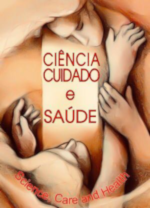Perspectivas de vida e de viver de pessoas em tratamento hemodialítico
Resumo
Objetivo: compreender a perspectiva de vida e de viver de pessoas em tratamento hemodialítico. Método: pesquisa qualitativa com embasamento fenomenológico de Martin Heidegger, realizada com 15 pessoas em tratamento hemodialítico, em um hospital geral do Sul de Minas Gerais. Utilizou-se um roteiro para caracterização dos participantes e a entrevista gravada. Para elucidar o fenômeno, desenvolveram-se as etapas da trajetória fenomenológica utilizando-se o existencialismo. Resultado: à luz de Heidegger foram apreendidas três categorias que emergiram das unidades de significado: A pessoa em tratamento hemodialítico: enfrentamentos; o convívio social: limitações e desafios; Ente doente: possibilidades e perspectiva de vida. O Ser desvelou dificuldade em relação à limitação da doença e do tratamento, uma vez que as escolhas transpassam a sua vontade; a importância dos familiares e profissionais de saúde na superação da dependência e na valorização como Ser social; e a expectativa de futuro está relacionada à realização do transplante renal. Considerações finais: foi possível compreender a vivência da pessoa em tratamento hemodialítico enquanto um Ser-aí, Ser-no-mundo e Ser-para-os-outros, assinalando as vertentes do homem como projeto, sua intencionalidade, potencialidades e factibilidade perante os fenômenos doença, tratamento e vida.
Downloads
Referências
Franco AO, Starosta RT, Roriz-Cruz M. The specific impact of uremic toxins upon cognitive domains: a review. J BrasNefrol. 2018;41(1):103-111. doi: http://dx.doi.org/10.1590/2175-8239-jbn-2018-0033
Coutinho MPL, Costa FG. Depression and chronic renal failure: a socio-psychological analysis. Psicol Soc. 2015;27(2):449-459. doi: http://dx.doi.org/10.1590/1807-03102015v27n2p449
Pauletto MR, Beuter M, Thomé EGR, Girardon-Perlini NMO, Camponogara S, Timm AMB. Patients' perception for kidney transplantation on hemodialysis out of waiting list. Rev Enferm UFPE. 2016;10(4):1194-1201. doi: 10.5205/reuol.8464-74011-1-SM.1004201604
Cruz MRF, Salimena AMO, Souza IEO, Melo MCSC. Discovery of chronic kidney disease and everyday of hemodialysis. Cienc Cuid Saude. 2016;15(1):36-43. doi: https://doi.org/10.4025/cienccuidsaude.v15i1.25399
Braga TBM, Farinha MG. Em busca de sentido para a existência humana. Rev Abordagem Gestalt [Internet]. 2017 [citado em 10 abr 2018]; 23(1):65-73. Disponível em: http://pepsic.bvsalud.org/pdf/rag/v23n1/v23n1a08.pdf
Ministério da Saúde (BR). Conselho Nacional de Saúde. Resolução n. 466, de 12 de dezembro de 2012. Aprova diretrizes e normas regulamentadoras de pesquisas envolvendo seres humanos [Internet]. Brasília: Ministério da Saúde: 2012 [citado em 14 out 2019]. Disponível em: http://conselho.saude.gov.br/resolucoes/2012/Reso466.pdf
Minayo MCS. O desafio do conhecimento: pesquisa qualitativa em saúde. São Paulo: Hucitec: 2013.
Bastos CCBC. Qualitative research phenomenological basis and the analysis of the structure of the situated phenomenon: some contributions. Rev Pesqui Qual [Internet]. 2017 [citado em 22 nov 2018]; 5(9):442-451. Disponível em: https://editora.sepq.org.br/index.php/rpq/article/view/156/93
Marinho CLA, Oliveira JF, Borges JES, Fernandes FECV, Silva RS. Associação entre características sociodemográficas e qualidade de vida de pacientes renais crônicos em hemodiálise. Rev Cuid. 2018;9(1):2017-2029. doi: https://doi.org/10.15649/cuidarte.v9i1.483
Souza AM, Filipini CB, Rosado SR, Dázio EMR, Fava SMCL, Lima RS. Kidney transplantation: experience of men in hemodialysis entered on the waiting list. Rev Rene. 2015;16(1):11-20. doi: https://doi.org/10.15253/2175-6783.2015000100003
Nerbass FB, Correa D, Santos RG, Kruger TS, Sczip AC, Vieira MA, et al. Perceptions of hemodialysis patients about dietary and fluid restricions. J Bras Nefrol. 2017;39(2):154-161. doi: http://dx.doi.org/10.5935/0101-2800.20170031
Costa DM. Corpordeidade e existência em Heidegger. Rev Ideação. 2018;(38):147-158. doi: http://dx.doi.org/10.13102/ideac.v1i38.4289
Santos AG, Monteiro CFS, Nunes BMVT, Benício CDAV, Nogueira LT. The nursing care analyzed according the essence of the care of Martin Heidegger. Rev Cuba Enferm [Internet]. 2017 [citado em 29 set 2018];33(3). Disponível em: http://www.revenfermeria.sld.cu/index.php/enf/article/view/1529/295
Fleig M. Nat Hum [Internet]. 2003 [citado em 28 nov 2019];(1): 253-256. Disponível em: http://pepsic.bvsalud.org/scielo.php?script=sci_arttext&pid=S1517-24302003000100011&lng=pt&nrm=iso
Heidegger M. Princípios metafísicos de la logica. Espanha: Sintesis: 2009.
Torres JV. Angústia e desamparo numa perspectiva Heideggeriana. Rev Persp Filosófica [Internet]. 1999 [citado em 28 nov 2019];1(11). Disponível em: https://www3.ufpe.br/ppgfilosofia/images/pdf/pf11_artigo60001.pdf
Strieder LW. Authenticity of emancipation between Heidegger and Rodolfo Kusch. Rev Intern J Pil. 2015;6(1):191-201. doi: http://dx.doi.org/10.7443/problemata.v6i1.24249
Nascimento MEB, Mantovani MF, Oliveira DC. Care, disease and health: social representations among people on dialysis treatment. Texto & Contexto Enferm. 2018;27(1):1-10. doi: http://dx.doi.org/10.1590/0104-07072018003290016
Franco de Sá A. Between anxiety and pain: a dialogue between Martin Heidegger and Ernst Jünger. Nat Hum [Internet]. 2016 [citado em 11 dez 2019];18(1):144-156. Available from: http://pepsic.bvsalud.org/pdf/nh/v18n1/v18n1a08.pdf
Oliveira APB, Schmidt DB, Amatneeks TM, Santos JC, Cavallet LHR, Michel RB. Quality of life in hemodialysys patients and the relationship with mortality, hospitalizations and poor treatment adherence. J Bras Nefrol. 2016;34(4):411-420.doi: http://dx.doi.org/10.5935/0101-2800.20160066
Heidegger M. Sobre a essência da verdade. São Paulo: Nova Cultural, 1999.
Oliveira VA, Schwartz E, Soares MC, Santos BP, Viegas AC, Lecce TM. Limits and possibilities daily post illness for women witch chronic kidney disease on hemodialysis. Rev Enferm UFPI [Internet]. 2015 [citado em 11 nov 2018];4(2):76-77. Disponível em: http://www.ojs.ufpi.br/index.php/reufpi/article/viewFile/3225/pdf
Manzi R. O que seria a consciência na fenomenologia heideggeriana. Griot. 2016;13(1):183-99. doi: https://doi.org/10.31977/grirfi.v13i1.690
Weyn KM. The existential phenomenology of Heidegger and the criticism of positive sciences. Em curso. 2015;(2):1-6.doi: http://dx.doi.org/10.4322/201511241644
Campos CGP, Mantovani MF, Nascimento MEB, Cassi CC. Social representations of illness among people with chronic kidney disease. Rev Gaúcha Enferm. 2015;36(2):106-112. doi: http://dx.doi.org/10.1590/1983-1447.2015.02.48183
Copyright (c) 2020 Ciência, Cuidado e Saúde

This work is licensed under a Creative Commons Attribution-NonCommercial 4.0 International License.




















